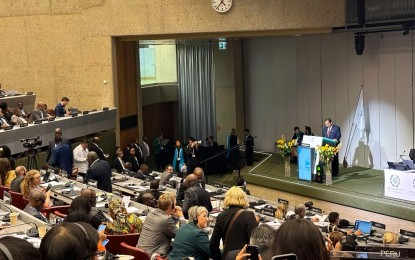
PH INNOVATION AGENDA. House of Representatives Speaker Ferdinand Martin Romualdez (on stage) highlights the strides the Philippines has taken in the areas of science, technology, and innovation under the leadership of President Ferdinand R. Marcos Jr., at the opening session of the 149th Inter-Parliamentary Union (IPU) Assembly at the International Conference Center in Geneva, Switzerland Monday night (Oct. 14, 202, Manila time). He said the President and Congress have been taking steps to promote science, technology, and innovation to sustain the nation’s development. (Photo courtesy of Office of the Speaker)
MANILA – House of Representatives Speaker Ferdinand Martin Romualdez has showcased before the international community the country’s progress in the areas of science, technology, and innovation under the leadership of President Ferdinand R. Marcos Jr.
Speaking at the opening session of the 149th Inter-Parliamentary Union (IPU) Assembly in Geneva, Switzerland on Monday night (Manila time), Romualdez said the President and Congress have been taking steps to promote science, technology, and innovation to sustain the nation’s development.
“In line with the legislative priorities of the President, the National Innovation Council was created to ensure that innovation is embedded as a key priority in our country's pathway to socio-economic development,” he told his fellow lawmakers and parliamentarians from all over the world.
He said the council, which Marcos chaired, administers a 10-year policy vision, goals, and strategies, collectively called the National Innovation Agenda and Strategy Document.
The document, he pointed out, contains the Philippines’ vision and long-term goals for innovation and a road map of the strategies for improving innovation governance, deepening and accelerating innovation efforts, and integrating and fostering public-private partnerships, mindful of the policy of "leaving no Filipino behind.”
Romualdez said the Philippine Congress, in support of the 2030 Agenda for Sustainable Development, has also enacted several measures to improve innovation governance in the country, including Republic Act (RA) 11293, also known as the Philippine Innovation Act; RA 11927, or the Philippine Digital Workforce Competitiveness Act; and RA 10055, or the Technology Transfer Act of 2009.
The Digital Workforce Competitiveness Act aims to address gaps in digital technology and skills by providing programs that equip Filipinos with the necessary competencies for the global labor market.
The law ensures support for the digital workforce through co-working facilities and loans with concessional terms. It also allows public-private partnerships to plan and implement training, skills development, and certification programs for digital careers.
The Technology Transfer Act, meanwhile, seeks to promote and facilitate the transfer and commercialization of intellectual property, technology, and knowledge resulting from research and development programs funded by the government for the benefit of the Philippine economy.
Under the 2023-2028 Philippine Development Plan, the government has emphasized the importance of innovation in achieving deep socioeconomic transformation, Romualdez said.
The Department of Science and Technology (DOST) launched PAGTANAW 2050, the first DOST-funded inter-disciplinal and trans-disciplinal project on a Philippine-focused Science Technology Innovation Foresight and Strategic Plan.
The plan is a compendium of science, technology, and innovation megatrends, global and national societal goals, trans-disciplinary operation areas, and current and emerging technologies relevant to the nation's development that are firmly grounded in the aspirations of Filipinos.
He said the initiatives taken by Marcos and measures enacted by Congress have “borne dividends for our country.”
He noted that in the 2024 Global Innovation Index of the World Property Organization, which measures the innovation-based performance of 130-plus economies, the Philippines rose in rank from 59th in 2023 to 56th place this year.
In the same report, the Philippines was recognized as one of the decade's top innovation performers, having achieved its highest rank at 50th place in 2020 during the global pandemic, he said.
“With all these legislation, policies, and programs, in terms of innovation governance, the Philippines’ Global Innovation Index has been increasing over the last decade. In fact, the Philippines is recognized as one of the middle-income economies with the fastest innovation catch-up,” Romualdez told his IPU audience.
Addressing dev’t issues
Romualdez, meanwhile, emphasized the importance of science, technology, and innovation in addressing development issues that developed and developing nations are facing.
“The complementary, interdependent nature of these three different concepts means that they must be considered as one – together. Science, technology, and innovation serve as our guiding lights of hope,” he said.
“They are our tools in addressing some of the most pressing issues we have today. They support us in achieving our sustainable development goals and in shaping future peace. They hold vast potentials to form and drive global solutions to the world's problems.”
Romualdez said science, technology, and innovation are also key drivers that enable and accelerate the global transformation towards prosperous, inclusive, and environmentally sustainable economies in developing and developed countries alike.
“They are the pillars of sustainable development. They have the strong potential to contribute to the achievement of almost all the sustainable development goals. They are the heart of international cooperation and global partnerships for development,” he said.
Romualdez called for global cooperation to attain the world’s common goals.
“As we continue to work for our respective nations’ sustainable development ambitions, we need as well to work hand in hand to achieve our common global goals. Let me then urge each one of us to foster collaboration, equity, and responsibility. It is through this collaboration that we can harness the technological tools to be able to build a future not only more sustainable but more peaceful,” he said.
He also urged his colleagues to take advantage of the potentials of science, technology, and innovation and use them fully and responsibly to address the challenges of the times.
“Let us ensure that innovations and technological advancements are accessible to all. Let us unite together and continue to cooperate for the betterment of the world we live in,” he said.
The five-day IPU conference focuses on the theme “Harnessing Science, Technology and Innovation for a More Peaceful and Sustainable Future.” (PNA)
